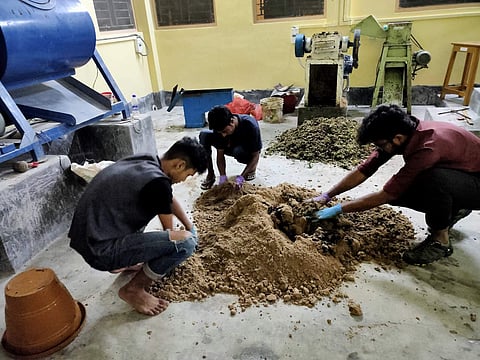

Researchers from the Waste Management Research Group (WMRG) at Indian Institute of Technology (IIT), Guwahati led by Prof Ajay S Kalamdhad have developed a new approach to assist municipal corporations in managing organic waste.
The novel two-stage biodegradation technique combines Rotary Drum Composting with Vermicomposting (RDVC), resulting in an efficient and environmentally friendly process and enables municipal corporations to derive value-added products from organic waste. This technique was also used to produce nutrient-rich soil conditioners from invasive aquatic weeds like the water hyacinth.
Municipal solid waste deposited in open dumpsites often contains over 50% organic material, generating substantial heat due to long-term decomposition. This not only poses environmental challenges but also hinders the achievement of sustainable development goals (SDGs). Compared to other waste biodegradation techniques that require two to three months, Rotary Drum Composting (RDC) can convert diverse organic feedstocks into nutrient-dense compost within just 20 days and significantly reduce the municipal waste volume by 60-70%.
However, the limitation of RDC is inferior compost quality. Vermicomposting is a superior biodegradation process that traditionally requires a minimum of 60 days, making the process less adaptable for urban municipal corporations.
Clubbing the benefits of both these processes WMRG, IIT Guwahati has developed a unique strategy of two-stage biodegradation. Speaking about the novel technique Prof Ajay S Kalamdhad, Department of Civil Engineering, IIT Guwahati said, ”We optimsed the Rotary Drum Composting technique and combined it with vermicomposting to reduce the duration of biodegradation. The earthworms, Eisenia fetida, can acclimatise faster to partially degraded organic matter from the drum compost and produce vermicompost in just 27 days.“
The microbial composition of the compost was identified with metagenomic analysis. The final product was proven to be non-toxic and safe to be used as a nutrient-rich soil conditioner from waste (4.2% total nitrogen).
